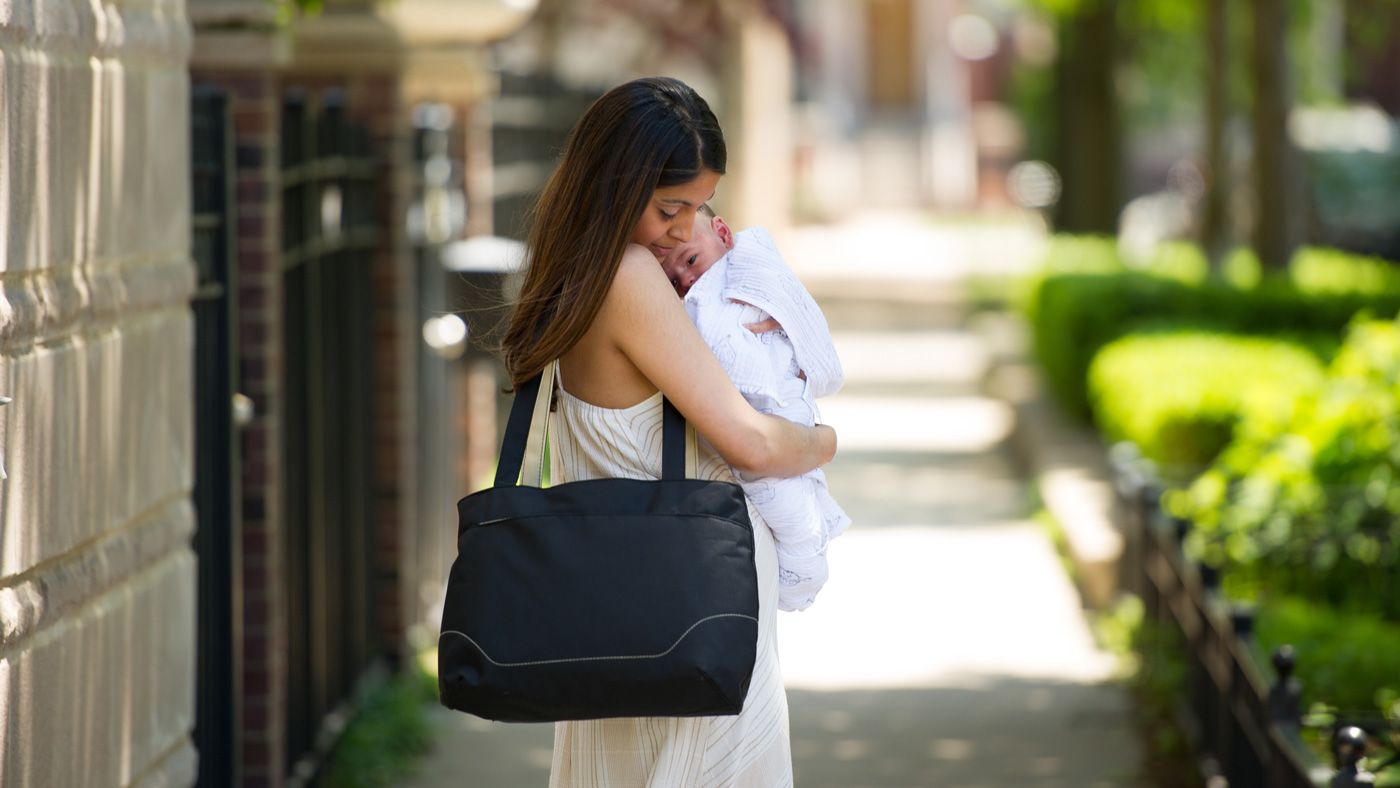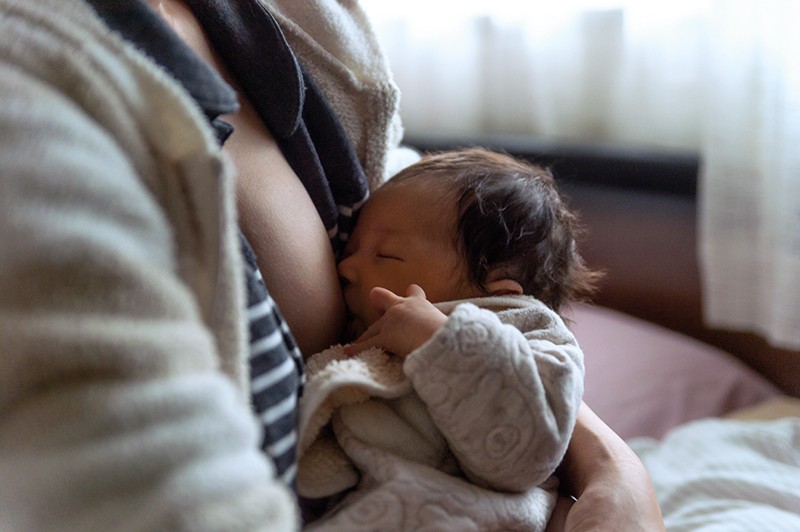- Can a mother who has tested positive for COVID-19 breastfeed her baby?
- Can a mother who has tested positive for COVID-19 stay with baby in the same room?
- Can infants in the NICU receive donor milk? Is this safe regarding COVID-19?
- Can infants in the NICU receive their mother’s expressed milk if she has COVID-19?
- How to protect baby from COVID-19
- Should a mother who has COVID-19 switch to formula feeding?
- If a mother had to stop breastfeeding due to illness with COVID-19 can she restart breastfeeding?
- Does COVID-19 affect breast milk supply?
- Does COVID-19 change breast milk colour

Download the guidance for health care professionals as PDF.
1: Can a mother who has tested positive for COVID-19 breastfeed her baby?
It is recommended that mothers who have confirmed or suspected COVID-19 continue breastfeeding or providing breast milk to their baby. Recent research has shown that mothers who have had COVID-19 pass on antibodies to their infant via their breast milk.
Steps to avoid spreading the virus to the baby include washing hands before holding the baby, and wearing a face mask when breastfeeding.
2: Can a mother who has tested positive for COVID-19 stay with baby in the same room?
It is recommended that even if a mother has suspected or confirmed COVID-19 her baby is kept with her in the same room on the maternity ward. Skin-to-skin contact is also encouraged as this helps with breastfeeding and breast milk production.
The American Academy of Pediatrics (AAP) issued guidance on July 22, 2020 regarding separation of mums and babies, based on the latest evidence.
Steps to avoid spreading the virus should be taught to the mother to help prevent passing on any respiratory droplets which could cause infection.
As stated by UNICEF, the Academy of Breastfeeding Medicine, WHO and the CDC, if the mother and baby are able to remain together, breastfeeding is encouraged. Currently, the primary concern is not whether the virus can be transmitted through breast milk, but rather whether an infected mother can transmit the virus through respiratory droplets. Therefore, the CDC recommends the mother wear a mask and use good hand hygiene before and after breastfeeding.
3: Can infants in the NICU receive donor milk? Is this safe regarding COVID-19?
If a mother cannot breastfeed or provide large enough quantities of her milk to her own infant, it is recommended that the first alternative should be pasteurised donor human milk (PDHM). Donor milk banks screen and test all mothers who donate milk. The breast milk is then pasteurised to additionally remove bacteria and viruses. COVID-19 virus has been shown to be destroyed by the standard pasteurisation techniques. PDHM is always considered a better choice than infant formula.
4: Can infants in the NICU receive their mother’s expressed milk if she has COVID-19?
Mothers can provide expressed milk for their baby who is in the NICU. The same safety prevention guidelines apply as for mother’s breastfeeding. The mother should be advised to wear a mask, have good hand hygiene, and avoiding coughing onto her chest wall. Mothers and her family supports should also be given good instructions for pump hygiene and milk collection.
5: How to protect baby from COVID-19
It is recommended that even if a mother has COVID-19 her baby is kept with her in the same room on the maternity ward. Breastfeeding is encouraged as research has shown that mothers who have had COVID-19 pass on antibodies to their infant via their breast milk. Skin-to-skin contact is also highly advised, when possible, as this supports effective establishment of breastfeeding and adequate breast milk production.
Steps to avoid spreading the virus will be taught to the mother to help prevent passing on any respiratory droplets which could cause infection. These steps include hand washing before holding the baby, and wearing a face mask when breastfeeding.
6: Should a mother who has COVID-19 switch to formula feeding?
UNICEF and the WHO states that breastfeeding is the safest, most reliable method of infant feeding in an emergency and therefore switching to formula feeding because a mother has tested positive for COVID-19 is not advised.
7: If a mother had to stop breastfeeding due to illness with COVID-19 can she restart breastfeeding?
If a mother has been separated from her infant for a period of time and breastfeeding was interrupted, re-establishing lactation when back together with her baby is generally possible and worth trying even if a return to full breastfeeding is not always achievable. The UNICEF UK guidelines can help mother to re-establish her milk supply and continue breastfeeding.
UNICEF UK recommend the following essential measures for management of breastfeeding for re-lactation:
- Start actions to increase hormonal response, including plenty of skin-to-skin contact, nuzzling at the breast and breast massage.
- Breast massage and hand/pump expression (8-10 times in 24 hours) may help when separated from baby or in-between feeds
- The baby should suckle frequently from both breasts at least 8-12 times in 24 hours, at least 15 minutes on each breast. Consider night feeds.
- Try having the baby also at the breast while pumping.
- The baby should be well attached to the breast for effective suckling and to avoid nipple trauma.
- Monitor baby’s stool and urine output
A Lactation Specialist should provide additional guidance and support to re-establish the mother’s milk production and control the baby’s growth.
8: Does COVID-19 affect breast milk supply?
It is unlikely that COVID-19 in itself reduces or dries up a mother’s breast milk supply. However, reduced breastfeeding frequency due to a mother feeling unwell with COVID-19 can lead to milk supply reducing. Milk supply works on the basis of ‘supply and demand’. The breasts need to receive enough signals (breastfeeds or pumping sessions) to continue making enough milk. It is advisable to speak to a breastfeeding specialist if there are concerns with the mother’s milk supply.
9: Does COVID-19 change breast milk colour
There is no research showing that COVID-19 changes the colour of breast milk. Breast milk can be different colours in different mothers for a variety of normal reasons. Read our article on this here.
Disclaimer
The information and materials provided on this website does not, and is not intended to, constitute legal advice; instead, all information available on this site are for general informational purposes only. Information on this website may not constitute the most up-to-date information. Medela reserves the right to supplement this website at any time or to change or delete any information or materials on this website.
This website contains links to other third-party websites. Such links are only for the convenience of the reader, user or browser; Medela does not recommend or endorse the contents of the third-party sites.
The information and materials on this web site is provided “as is”; no representations are made that the content is error-free. Whilst we have tried to ensure the accuracy and completeness of the information and materials on this website, we do not warrant or guarantee the accurateness, completeness, adequacy or currency of the information and materials contained in or linked to this website.
All liability with respect to actions taken or not taken based on the content of this website are hereby expressly disclaimed. Your use of content contained in or linked to this website is entirely at your own risk. Medela accepts no liability for any loss or damage howsoever arising out of the use of this website or reliance on the content of this website.























